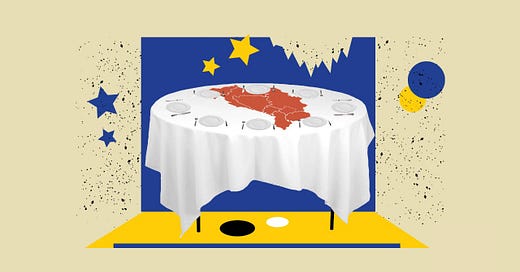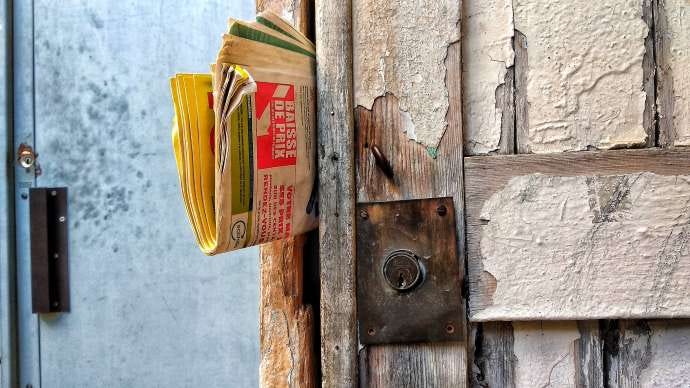XLV. The Spectre of the Balkans' Past
There is a mystery of a non-paper sent from Slovenia to Brussels, where all national borders are changed to complete the dissolution of Yugoslavia. Not only reactions, but also silence is worrying
Hi,
welcome back to BarBalkans, the Italian newsletter whose aim is to give a voice to the Western Balkans’ stories, on the 30th anniversary of the Yugoslav Wars.
We have to talk about Yugoslavia, like never before.
A specter is haunting Europe: the specter of the Balkans’ Past (a tribute to Charles Dickens, but also to Karl Marx, on May 1st).
The specter of the Balkans’ Past is an informal document that everyone is talking about, and no one knows what it really is.
A non-paper, which would “effectively complete” the unfinished breakup of former Yugoslavia and would change all national borders.
A mystery that arrived in Brussels from Ljubljana, and returned to the Western Balkans like a boomerang.
It triggered angry reactions and worrying silences.
An old-time mystery.
The mystery of the non-paper
The mystery can be traced back to early April.
On April 12, the Bosnian media dropped a bombshell: the Slovenian premier, Janez Janša, was planning a controversial project concerning the borders in the region.
According to rumors, the government in Ljubljana delivered a non-paper to the President of the European Council, Charles Michel, at the end of February or early March, on the proposed Slovenian EU presidency’s priorities (from July 1).
A non-paper is an informal document, a draft agreement.
In that document, Prime Minister Janša explained the need to complete the “peaceful dissolution of former Yugoslavia”, through a change of State borders.
With the exception of Slovenia, all Balkan countries would be involved.
From Serbia to Kosovo, Montenegro, North Macedonia and Albania. But especially Bosnia and Herzegovina, with its complex ethnic framework.
Only three days later, the second bombshell was dropped. The Slovenian website necenzurirano.si published some extracts (of the text), revealing the most controversial parts.
The non-paper section of the document would be titled “Western Balkans - The way forward” and would leave no room for doubt on how to put an end to the «unresolved tension among Serbs, Albanians and Croats»:
Dismemberment of Bosnia and Herzegovina, including the Republika Srpska entity assimilated to Serbia and the Croatian cantons to Croatia. Bosniaks would be guaranteed an independent State and the possibility to join the EU through a referendum;
Unification of Albania and Kosovo, with the Serbian minority protected by a special status;
Change of the borders of Montenegro and North Macedonia, in favor of an inclusion of all the Albanian minorities in the State of Albania.
If the document were authentic, it would be a real time bomb in the Balkans.
But this is the point. IF it were authentic.
Analyzing the extracts published, some doubts rise about their authenticity.
There are inaccuracies in terms of drafting, layout and lexicon. Approximations on a formal level, even for an informal document.
This is why it seems hard to believe that the mystery of the non-paper was solved by the Slovenian website’s leak. No serious international newspaper has considered the source completely reliable.
However, this does not exclude the existence of a (real) mystery document.

The Balkan powder keg
The first issue concerning the existence (or otherwise) of the non-paper is related to the fact that the dispute is stirring dangerous dreams in the Balkans, even if the Slovenian government has categorically denied everything.
Or, as far as we know, no one really seems to have actually seen it.
Except for the Albanian Prime Minister, Edi Rama: «I saw the document and I discussed the idea with the Slovenian premier», he told the press.
Nobody listened to him.
On the contrary, on Twitter Janša ferociously denied every rumor of a secret plan:
«The last time I met the President of the European Council was last year. It would have been difficult for me to have physically handed over anything to him in February or March this year, as reported by the media».
The Prime Minister also said that «the Slovenian government is seriously looking for solutions for the development of the region and of the European perspective on the Western Balkans», defending himself from the accusation of «trying to prevent this goal».


The thing is that the Western Balkans have become a powder keg (again).
In Slovenia, the opposition parties asked the Foreign Minister, Anže Logar, to report to the Parliament.
The Serbian President, Aleksandar Vučić, immediately confirmed that he has nothing to do with the affair and that he supports «the existing borders of Serbia, with Kosovo included» and those «of Bosnia and Herzegovina, with Republika Srpska included».
Not only «peace and complete stability are essential for Serbia», Vučić added, but the unification of Kosovo and Albania «is unacceptable».
From Pristina, President Vjosa Osmani’s entourage rejected «any discussion that affects the territorial integrity of the Republic of Kosovo».
The Deputy Prime Minister of North Macedonia, Nikola Dimitrov, described the project as «dangerous» and recalled the importance of «not creating larger States, but making our democracies and economies strong in the EU perspective».
Miodrag Vlahović, former Head of diplomacy in Podgorica, pointed out that Montenegro is the «collateral victim of the clash between Serbian and Albanian nationalism», referring to the content of the alleged non-paper.
On the other hand, a very dangerous domino effect has been initiated.
The Slovenian ambassador to Sarajevo, Zorica Bukinac, was immediately invited for clarification by the Croatian member of the Bosnian presidency, Željko Komšić.
Meanwhile, the Serbian member of the presidency, Milorad Dodik, stated that the Republic of Srpska entity should begin a process of peaceful separation from the rest of the country.
Such fragile balances should not be challenged.

Embarrassing silence
But what is really astonishing is the non-position of the European Council on the non-paper.
It is crucial to understand this issue, because the whole mystery could be unraveled anytime by the minor comment of President Charles Michel or his entourage.
On the contrary, there is complete silence.
No confirmation. No political stand-off.
And we have to remind that the press in Brussels is not spoon-fed.
For weeks EU journalists have put pressure on the Council, including myself (for Eunews’ newsroom), and especially colleagues more experienced on the EU bubble, such as Politico, Euronews and Euractiv. However, the EU Council’s press officers hid behind a sterile “no comment”.
«At this point there is no comment we can share on this. «No updates». «When there is something new to share, we will get in touch».
It seems to be playing cat and mouse, but the roles are not well defined. At the same time, this game turns the spotlight on a questionable approach.
In this way, the EU Council is only raising suspicions that there is really something under the surface.
Or, even worse, that it is deliberately not caring about an unstable situation.

It would take little to reveal the mystery.
For example, as soon as asked, the European Commission answered clearly. «We did not see or are aware of the non-paper», Peter Stano, spokesperson for Foreign Affairs and Security Policy, stated.
Moreover, Stano confirmed that «on the issue of Balkan borders, there is nothing to change» and that the only interest is for «regional cooperation and reconciliation».
A turning point in the enlargement of the European Union in the Western Balkans is essential for the EU Commission. It cannot afford any mistakes.
We have to remember that the EU executive power would be in a better position for not commenting than the EU Council.
It is usual practice when a controversy involves an EU Member State and another European institution. This time it did not happen, it is a sign.
Those who avoid sharing their position, have clarified it. Those who were to take a stand, are hiding.
The specter of the Balkans’ Past is still haunting Europe.
Pit stop. Sittin’ at the BarBalkans
We have reached the end of this piece of road.
Since we have been all the time in the company of ghosts and mysteries, let’s try to reveal some of them at our bar, the BarBalkans.
Our trusted host shows us an amphora, with a suggestive label: Navis Mysterium.
The mystery of the ship.
It comes from Croatia. From the first underwater winery in the world.
Along the Pelješa peninsula, not far from Dubrovnik, we can find the small village of Drače. Here, in the middle of the fine vineyards of the Dalmatian coast, the wine aging takes place in terracotta amphorae lowered into the Adriatic Sea.
The journey begins in 2013, when the first bottle of red wine was drowned for 2 years. Edivo Winery obtained the license for underwater aging and the sale of wine in amphora.
The wine is made from local grapes. It is bottled in oak barrels for a year and then it is drowned to a depth between 18 and 25 meters. And it ages for another year or two.
Every 14 days a team of divers checks the underwater cellars, during some guided tours for tourists organized by the Winery.
During this time, the wine is sealed in the amphora and it does not see daylight until the amphora is opened for tasting.
But it is not only the wine to be a special product.
The Winery explains that «each amphora is a unique sculptural product», once it is brought back to the surface and cleaned through a certified process (which lasts two weeks).
«Corals, shells and algae are part of the packaging design». A real «souvenir designed by the Adriatic Sea».
Let’s continue the BarBalkans journey. We’ll meet again in a week, for the 46th stop.
A big hug and have a good journey!
BarBalkans is a free weekly newsletter. Behind these contents there is a lot of work undertaken. If you want to help this project to improve, I kindly ask you to consider the possibility of donating. As a gift, every second Wednesday of the monthyou will receive a podcast with an article about the dissolution of Yugoslavia.
If you want a preview, just listen to BarBalkans - Podcast. You can find it on Spreaker and Spotify!
As always, I thank you for getting this far with me. If you are interested in the figure of the Slovenian prime minister, I recommend you these previous newsletters (while here you can find all the others):
If you want to help me to make this experience grow, you can invite whoever you want to subscribe to the newsletter:
Pay attention! The first time you will receive the newsletter, it may go to spam, or to “Promotions Tab”, if you use Gmail. Just move it to “Inbox” and, on the top of the e-mail, flag the specific option to receive the next ones there.
BarBalkans is on Facebook and Instagram, while on Linktree you can find the updated archive.







